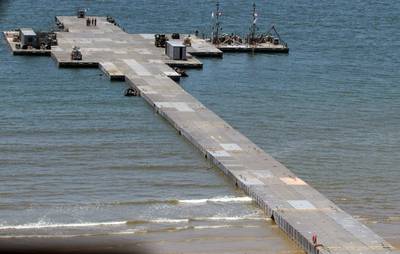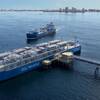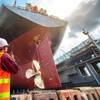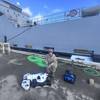Biden's Pier for Gaza Aid Might Not be Ready for 60 Days
U.S. President Joe Biden's plan to build a floating U.S. military port to speed up aid to Gaza could take up to 60 days to become a reality and involve more than 1,000 American troops, the Pentagon said on Friday.
The Pentagon offered the timeline a day after Biden announced the initiative in his State of the Union speech, as he seeks to cool anger in his Democratic Party over his staunch support for Israel's offensive in Gaza since Oct. 7.
The United Nations has warned that widespread famine in the Gaza Strip is "almost inevitable" without urgent action. A formal conclusion that famine has arrived in the coastal enclave of 2.3 million people could come next week. The U.N. has said that once famine is declared, it is too late to help many people.
"Children in Gaza cannot wait to eat. They are already dying from malnutrition and saving their lives is a matter of hours or days - not weeks," said Jason Lee at Save the Children.
Some U.S. lawmakers and aid organizations said the floating pier system masked the bigger issue: the failure to get Israel's government to allow more aid to enter Gaza by land, which is the fastest, most efficient option.
"This is not a logistics problem; it is a political problem," said Avril Benoît, executive director for Médecins Sans Frontières (Doctors Without Borders) in the United States.
"Rather than look to the US military to build a work-around, the US should insist on immediate humanitarian access using the roads and entry points that already exist."
Planning still in early stages
Air Force Major General Patrick Ryder, the Pentagon's chief spokesperson, described the planning for the port system as still in its early stages, with deployment orders just starting to go out to those troops who will head to the Middle East.
The Pentagon said it had also not yet determined exactly how the landing site for the floating port system would be secured against any threats and said it was in discussions with partners including Israel.
Asked whether the Pentagon anticipated the port system would be targeted by Palestinian militant group Hamas, which the U.S. calls a terrorist organization, Ryder said: "That's certainly a risk."
"But if Hamas truly does care about the Palestinian people, then, again, one would hope that this international mission to deliver aid to people who need it would be able to happen unhindered," Ryder said.
Still, in a sign that security was a concern, Ryder said no U.S. troops would enter Gaza, even temporarily, to complete port construction.
The U.S. port system being envisioned for Gaza involves two separate components, the first being construction of a floating, offshore barge that would be able to accept aid deliveries.
The U.S. military would then move aid from there to a floating, 1,800 foot-long (550 meter) causeway anchored to the shore.
Once operational, the port system would allow delivery about 2 million meals to Gazans daily, Ryder said.
By comparison, the U.S. military has delivered a total of about 124,000 meals during four airdrops in the past week. The latest airdrop on Friday delivered about 11,500 meals, the U.S. military said.
Criticism from Republicans
Asked about social media reports on Thursday that some airdropped U.S. aid had killed people as it landed, Ryder said the U.S. was confident no U.S. airdropped aid resulted in casualties. He noted that reports of fatalities on Thursday emerged five minutes before Thursday's airdrop occurred.
While many of Biden's Democratic allies applaud the aid push, some Republican lawmakers criticized it.
"Building a port in Gaza is building a port for Hamas," Republican Senator Marco Rubio wrote on X.
U.N. aid chief Martin Griffiths on Friday described the United Nations role in the U.S. plan as "limited at present."
He said he was contacted by the U.S. mission to the U.N. on Thursday to say Washington would work with the U.N. and that U.N. officials in the region had on Friday been speaking with the United States, including the U.S. military's Central Command.
"It's the beginning of a conversation ... it's going to be hard to get this to work quickly," Griffiths told reporters on Friday. "But we need help from wherever we can get it."
"What we need for Gaza is of course an immediate ceasefire, but we also need land routes. Land access is our primary one, that's where you get scale," Griffiths said.
(Reuters - Reporting by Phil Stewart, Kanishka Singh, Michelle Nichols, Patricia Zengerle and Humeyra Pamuk; Editing by Leslie Adler, Daniel Wallis, Don Durfee and Diane Craft)












